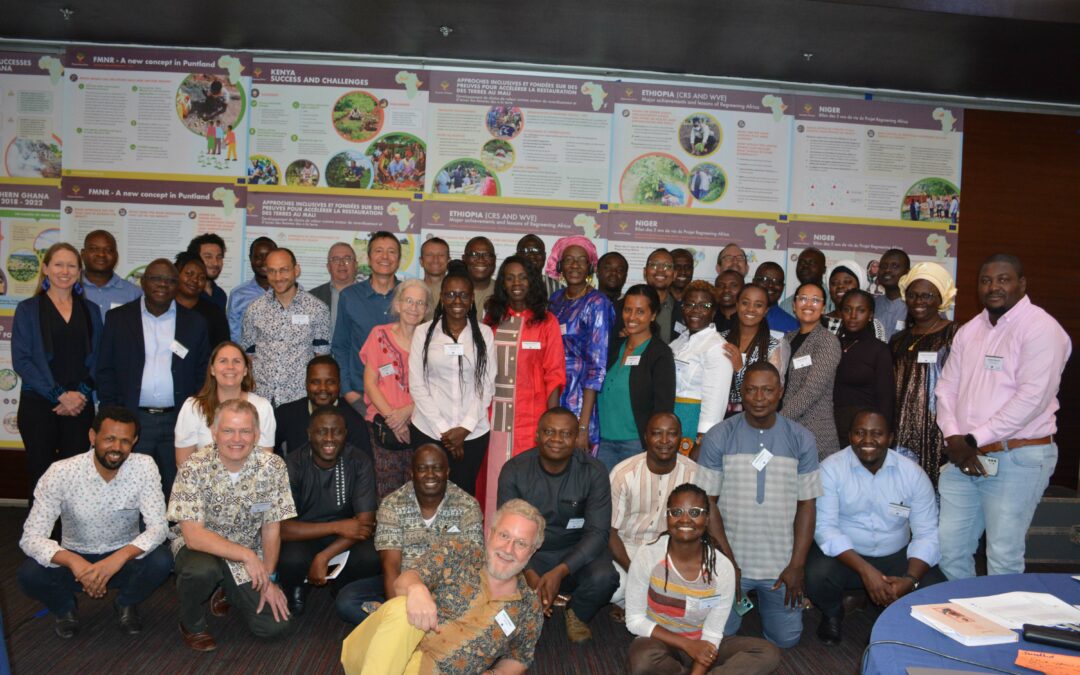By Marion Aluoch
“This project started with the belief, commitment and simple vision that we need trees on farms.” Benard Crabbe – Head of the Environment Mainstreaming and Circular Economy Sector at the European Commission.
The Regreening Africa Programme gathered with all partners in Rwanda from the 29th of November to the 3rd of December 2022 for the project close out workshop, which highlighted achievements, lessons learnt, and opportunities for future collaboration within and across countries as well as with the Great Green Wall Initiative.
In her reflections, Pauline Okumu, the National Director of World Vision Rwanda observed land restoration was key to food security, nutrition and economic development. She also committed World Vision Rwanda to scaling the practices implemented under the Regreening Africa Programme. She also stated that the programme was unique as it prompted them to do things differently, as there are no one-size-fits-all solutions to the challenges of land degradation.
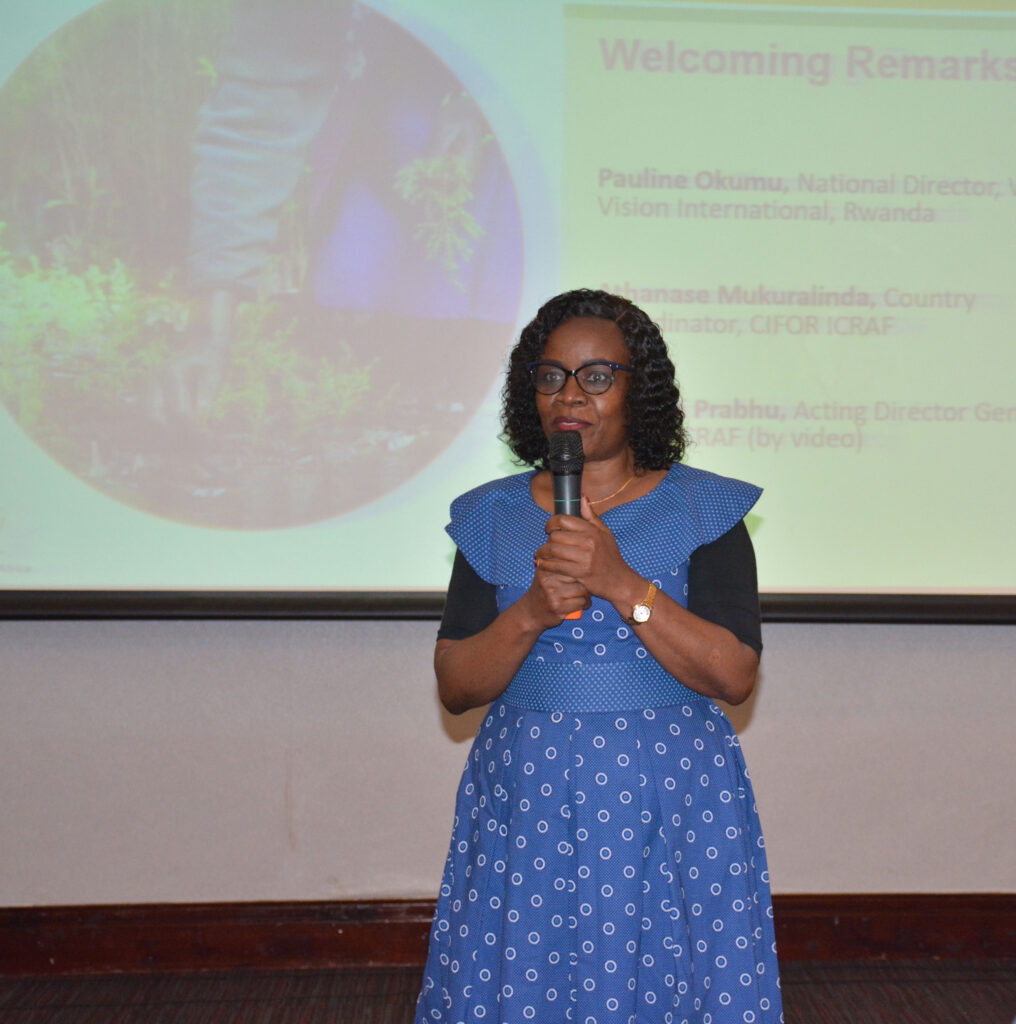 Pauline Okumu, the National Director of World Vision Rwanda, gives her reflections on the project. Photo: Regreening Africa/Marion Aluoch
Pauline Okumu, the National Director of World Vision Rwanda, gives her reflections on the project. Photo: Regreening Africa/Marion Aluoch
Athanase Mukuralinda, the CIFOR-ICRAF country representative for Rwanda, emphasised the significance of evaluating the economic cost of land degradation and demonstrating the economic benefit of land restoration to policymakers. This was especially crucial in Rwanda, where the government took a keen interest in ongoing restoration projects. The Rwandan government entered into performance contracts with small holder farmers to support them (in kind/cash), and in exchange, the farmers were required to demonstrate economic progress during the period of restoration. The economic progress over time was accomplished through the development of value chains.
Pascal Zahonero, the European Union Delegate to Rwanda, noted that there was still work to be done in order to achieve standard quality and sustainable development, such as the enhancement of biodiversity and the incorporation of economic development into land restoration. “Some of the objectives were achieved but more needs to be done to fully achieve others.” This means that we need to continue to work on a variety of other projects to ensure that these objectives are met.” Additionally, he stated that Rwanda requires all projects to demonstrate how the invested funds will contribute to economic growth.
Bernard Crabbe, from the the head of the Environment Mainstreaming and Circular Economy Sector at the DG INTPA European Commission, explained that the project began with “the belief, commitment, and a simple vision that we need trees on farms.” The most rewarding aspect of this journey has been meeting and working with diverse individuals who share this vision, despite the implementation challenges. In addition, he stated that the success of the programme is a result of strong partnerships and efficient coordination, which led to measurable outcomes achieved by various partners working with communities and farmers.
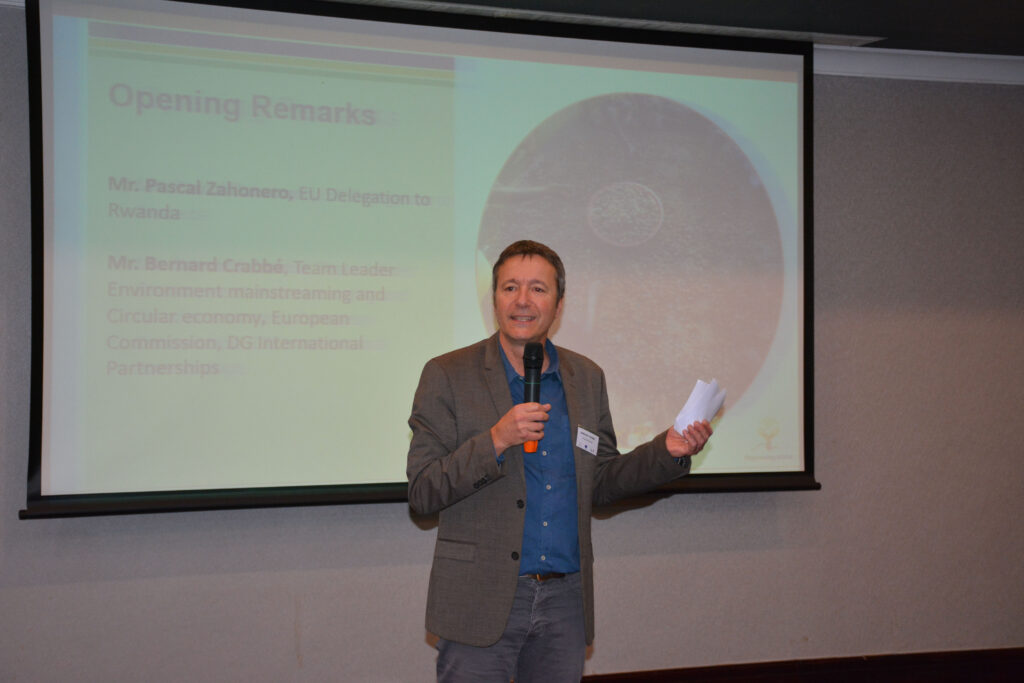 Bernard Crabbe, the head of the Environment Mainstreaming and Circular Economy Sector at the European Commission, sharing his insights on the project. Photo: Regreening Africa/Marion Aluoch
Bernard Crabbe, the head of the Environment Mainstreaming and Circular Economy Sector at the European Commission, sharing his insights on the project. Photo: Regreening Africa/Marion Aluoch
Ravi Prabhu, the Director Innovation, Investment and Impact at CIFOR-ICRAF stated in a video recording that the programme was extremely ambitious but has produced astounding results. These results were achieved through a willingness to learn and explore, as well as by forming strong partnerships.
The informative session with Regreening Africa partners focused on key project elements and insights and enabled implementing organisations to share their experiences through an interactive and engaging process and jointly reflect on the methods used to achieve impact, the key interventions that led to impact, opportunities, lessons learned, and next steps.
Cross-country practise dialogue panel of country implementing partners discussed the practises that have worked, where they have worked, and what has been attempted and learnt. Niger has worked with women’s groups to empower them economically by establishing small businesses, as well as assisting them in marketing their products at the local agricultural fair, where they receive feedback on how to improve them.
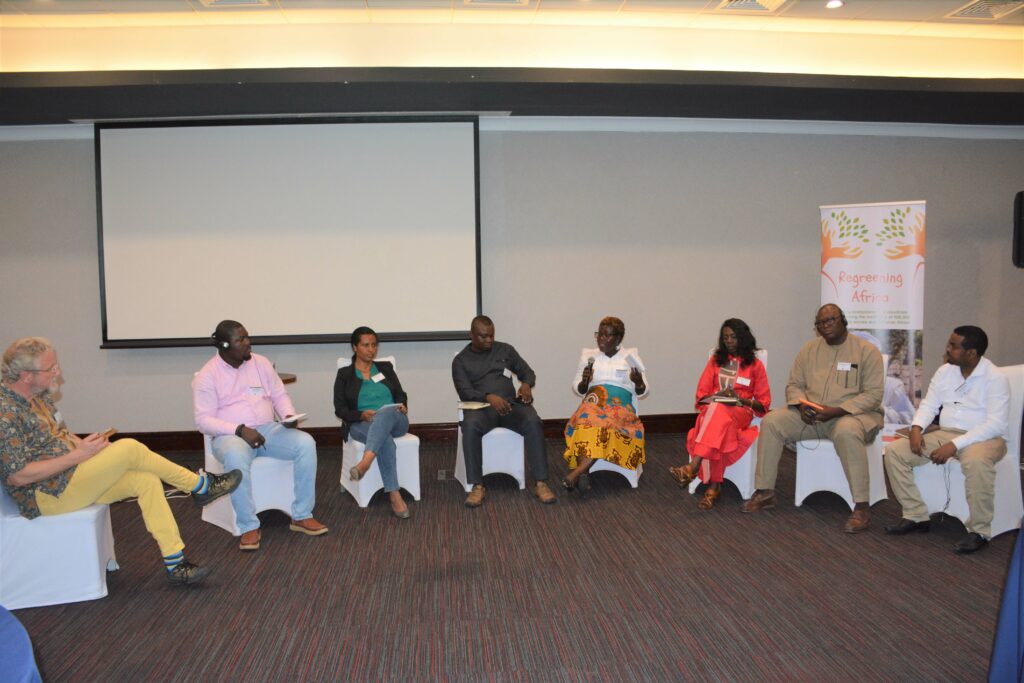 A cross-country dialogue panel of country implementing partners discussing the practises that have worked, where they have worked, and lessons learnt. Photo: Regreening Africa/Marion Aluoch
A cross-country dialogue panel of country implementing partners discussing the practises that have worked, where they have worked, and lessons learnt. Photo: Regreening Africa/Marion Aluoch
In Ethiopia, exclosures are the primary method for restoring degraded hillsides and rangelands. In the enclosures, FMNR, Assisted Natural Regeneration, and tree planting are also practised. The issue of conflict between herders and farmers was resolved in World Vision Senegal by bringing all parties involved together and collaborating with them to map out agreed pastoral routes. This has increased the effectiveness of law enforcement, resulting in fewer resource conflicts.
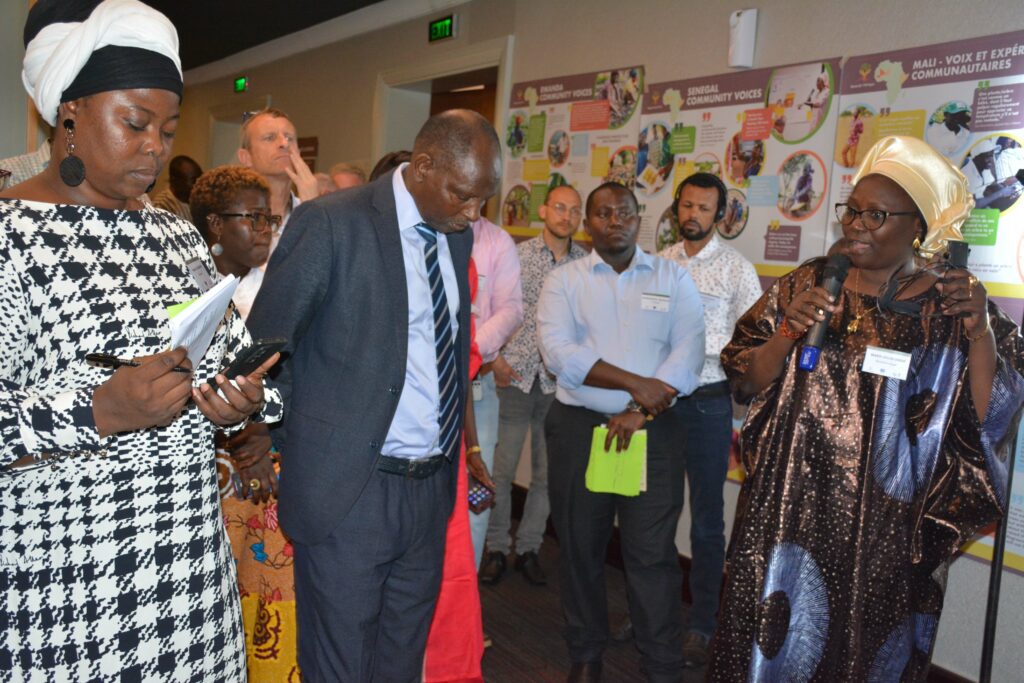 World Vision Senegal Zone Manager Marie-Louise elaborating a point during the evidence wall session. Photo: Regreening Africa/Marion Aluoch
World Vision Senegal Zone Manager Marie-Louise elaborating a point during the evidence wall session. Photo: Regreening Africa/Marion Aluoch
In Mali, the scaling strategy entailed collaborating with women who had received training in agroforestry entrepreneurship. Men now embrace agroforestry after observing the success of women’s work in the field. Sensitizing Puntland’s population to the importance of land restoration aided in reducing land degradation. As a result, the communities encouraged their fellow pastoralists to settle in the hills and leave the rangelands for restoration.
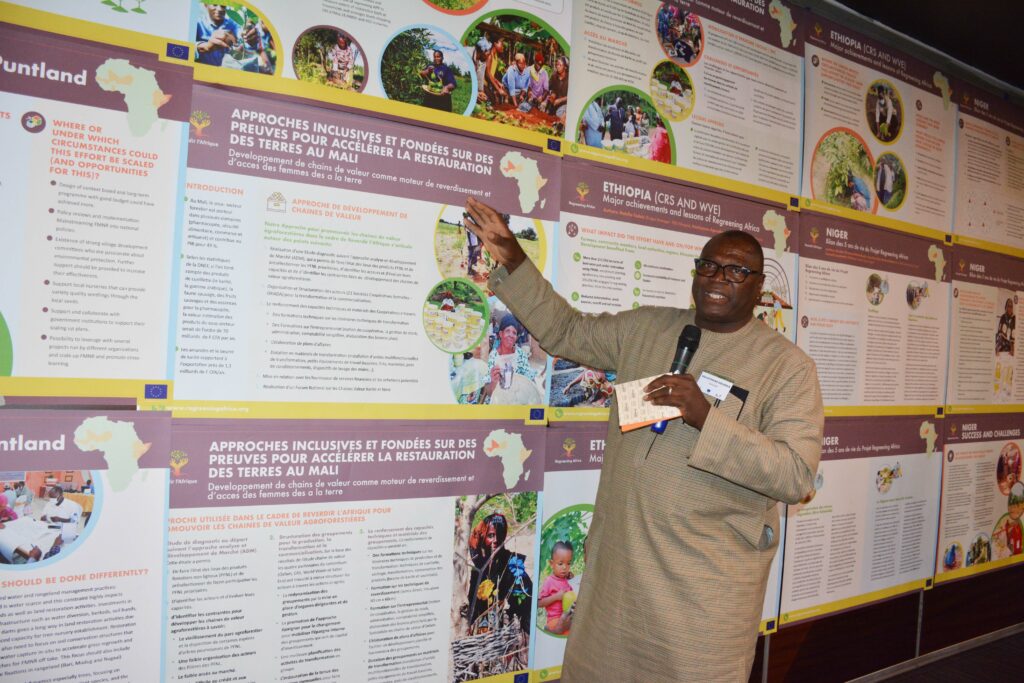 Souleymane Doumbia, project manager for Regreening Africa in Mali, presents during the evidence wall session. Photo: Regreening Africa/Marion Aluoch
Souleymane Doumbia, project manager for Regreening Africa in Mali, presents during the evidence wall session. Photo: Regreening Africa/Marion Aluoch
World Vision Ghana used the lead farmer strategy to ensure the project’s sustainability. The strategy consists of an equal number of male and female farmers, as well as a local leader chosen as a lead farmer to ensure that they have a reputable individual to enforce by-laws. It was also an epic moment when we honoured our implementing partners for their exemplary work and milestones as they scaled landscape restoration across their respective countries in Senegal, Kenya, Ghana, Mali, Rwanda, Ethiopia, Niger, Puntland, and Somaliland.
Regreening Africa’s impact on the ground will be the most lasting legacy it has built over the last five years. The primary determinant for success throughout the programme was the inclusion of diverse stakeholders. Early and comprehensive stakeholder engagements stimulated community ownership of the project. The programme also leveraged on technology to assess the impact of its interventions and the scalability of the project. The development of the Regreening Africa app represented the project’s greatest technological achievement. Farmers now have the ability to monitor, report, and evaluate restoration project progress thanks to the app.
To sum up all the achievements, Dennis Garrity, board of chair at the Global EverGreening Alliance reminded us that “this is just the end of a beginning. There will be more restoration engagement in the future,” and one thing is certain: “we have proven that large-scale restoration is possible and effective.”
This story was produced with the financial support of the European Union. Its contents are the sole responsibility of Regreening Africa and do not necessarily reflect the views of the European Union.

